There’s no city quite like Miami. It’s easy to be awed by the melting pot of Latin and Caribbean culture, historic Art Deco architecture, the glamorous nightclub scene, and the beaches. There’s also food for every craving. But there’s one more ingredient to Miami’s uniqueness. That’s its tropical ecosystem — the lush greenery and bounty of flowers that dot the landscape with color and texture.
I always try to stop and smell the flowers in Miami and take in the green spaces. Between the glamour of Collins Avenue and the aroma of a Cuban sandwich, it’s well worth the time to seek out Miami’s dedicated ecosystems and botanical gardens. Not only is it a chance to unwind, but it’s also a chance to explore some of the history of the region that will only add to your appreciation of The Magic City. Here are the essential gardens to visit in Miami.
Table of contents: ()
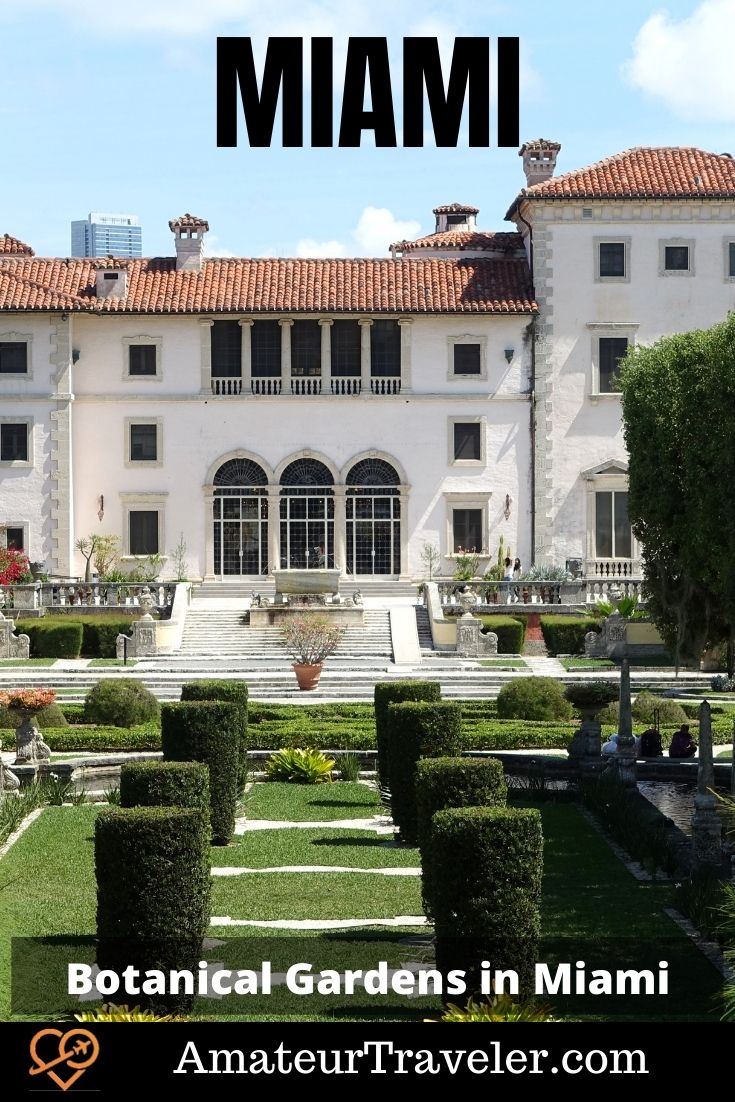
Miami Beach Botanical Garden
2000 Convention Center Dr.
Miami Beach, FL 33139
305-673-PALM (7256)
This one is my favorite. The Miami Beach Botanical Garden advertises itself as a “tropical oasis.” It’s a place of serenity inside the concrete and stucco of the city.
Here, the flora and fauna of Miami’s tropical climate are on brilliant display. Check out the palm garden, the edible garden, and the Japanese garden while you’re here and don’t miss the orchids! I’m always struck by the flowering trees in these gardens — the ylang-ylang and the frangipani are out-of-this-world heavenly scents.
A trip to the Miami Beach Botanical Garden is an experience for all the senses, and it’s a great place to get some inspiration for your own yard. The staff is more than happy to share information about the native plants in the area.
The garden offers art exhibitions and musical performances like a bossa nova show. You can also join some gentle stretching and yoga classes. I had the best time at the Miami Beach Cultural Crawl some years back. This is also a space to rent for weddings and parties. It’s tough to find a better venue for a destination wedding or engagement party.
The garden is one of the stops along the way, and a lucky visitor gets a chance to sample all the pieces of culture that make Miami Beach the treasure it is for visitors and neighbors.
Admission is free, although they suggest a donation of $5 per person. The garden is open Thursday through Sunday.
COVID-19: During this time of COVID-19, you are required to have tickets to enter, which you can get online.
Fairchild Tropical Botanical Garden
10901 Old Cutler Road
Coral Gables, Florida 33156
305) 667-1651
This glorious tropical garden has a mission: science and horticulture education. This slice of paradise is also instrumental in reintroducing native orchids to South Florida.
The Million Orchid Project involves nurturing young orchids in the micropropagation lab to reintroduce them across the region over a five-year period.
Imagine the old South Florida, where millions of orchids blanketed the trees and scented the breezes during orchid blooming season. An influx of people managed to diminish that floral paradise. It’s only recently that the Fairchild Tropical Botanical Garden swung into action to restore the orchid to its former glory. I plan to return to see how the project turns out.
That’s just one of the ways the garden is furthering the study of plant life in the Miami area. The garden also offers classes and workshops for kids and adults. If you’re super into orchids, or rare fruit or bromeliads, this garden supports the plant societies around South Florida’s native plants.
This garden is also available for weddings and private events.
The Fairchild Tropical Botanical Garden is open every day from 10 am to 4 p.m. A general admission ticket will cost you $25 for adults and $12 for kids 6 to 17. Check the garden’s website for special offers and discounts.
COVID-19: There are special hours for those who are more vulnerable to COVID-19. You’ll also have to buy your tickets online.
The Kampong
4013 South Douglas Road
Coconut Grove, FL
305-442-7169
The Kampong garden is part of a network of botanical gardens in Florida and Hawaii dedicated to studying the plants of the tropics. The garden boasts an amazing variety of tropical plants, flowers, and fruits. I’m particularly drawn to the fruit trees that produce avocados, mangoes, and citrus fruit. Jackfruit, which is trendy in some Asian and Asian fusion restaurants, is grown here as well. I’m not totally sold on jackfruit, but it’s cool to look at.
The Kampong also boasts cocoplums, egg fruit, candle fruit, and peanut butter fruit. You’ll find more than 50 different varieties of mango, and a whole project dedicated to growing breadfruit to help feed the world. I bet just the names of these tropical fruits made you hungry. The flowering trees and the ficus are other must-sees at The Kampong.
The garden sits on the former Fairchild estate. Dr. David Fairchild was a botanical explorer who traveled the world and brought back exotic plants to the United States. The Kampong is a fitting tribute to the man and his life’s work — and an attraction you won’t regret checking out.
You can book a two-hour tour online for $15 ($5 for kids under 12.)
Admission is free, although they suggest a donation of $5 per person. The garden is open Thursday through Sunday.
COVID-19: Reservations are required and all guests must wear a mask and practice social distancing.
Vizcaya Museum and Garden
3251 South Miami Ave.
Miami, FL 33129
305-250-9133.
This grand estate will transport you to another time when the graceful arches and Italianate architecture were home to the Vizcaya’s original owner, John Deering. Deering built the estate in the early 1920s when Miami was booming (and right before the 1926 Miami hurricane). It features the original mansion along with European-inspired gardens.
The Living Collection is home to orchids, mangroves, and a native forest. Deering planted most of the trees, and they’ve managed to weather several storms and survive to this day.
The manicured garden and beautiful structures preserve memories of a time when life in Miami was grand, and money and bootleg liquor flowed. It’s a testimony to both the resilience and beauty of the area. This is another spectacular location for weddings.
Grandeur aside, the Vizcaya is a tribute to Miami’s plant diversity. The botanical garden received two accreditations in 2019 from the American Public Gardens Association for its Jatropha and Staghorn ferns. Those ferns are a must-see for all green thumbs… and even people like me who have to really work at growing plants.
The museum and garden are open Thursday through Monday. The first tour begins at 9:30 a.m., and the last tour begins at 4:30 p.m.
COVID-19: Visitors are required to get their tickets online and wear masks. The garden also asks you to bring your own water, because the cafe and shop are currently closed.
Deering Estate
16701 SW 72nd Avenue
Miami, FL 33157
305-235-1668
The casual tourist might confuse this guy named Deering with the guy who built the Vizcaya Estate, but that would be a mistake.
The Deering Estate was built by Charles Deering, a Chicago industrialist who was into the environment and preservation a century ago, before it was trendy. The Deering Estate sits on Miami Rock Ridge, a property rife with caves, sinkholes, and other interesting features. It also has great hiking trails and two state aquatic preserves in the waters just off the estate.
While the Vizcaya is a jewel of groomed gardens, the Deering Estate is dedicated to the conservation of native plants and wildlife. That includes rare species recovery, in collaboration with the Fairchild Tropical Botanic Gardens. You’ll have several chances to see threatened and rare species on the grounds.
My personal favorite? The butterfly walks. The estate is home to some rare butterflies, and it’s always a magical moment to see them flitting from flower to flower in the Florida sunlight, sipping nectar as they go.
Tip: there are some hard and fast rules about taking pictures at the Deering Estate. Your personal photos will be fine on the main grounds, but if you’re thinking about taking fine art or portrait photos, you’ll need to buy a permit.
COVID-19: Due to COVID-19, tours of the historic home are on hold, but scheduled ghost tours and moonlight kayak tours are popular.
Crandon Park Gardens
6747 Crandon Boulevard
Key Biscayne, FL
305-365-2320
At Crandon Park Gardens, prepare to feel charmed, and maybe a little haunted. The property was once a coconut plantation. When the owner, Commodore William John Matheson, died, his heirs donated the place to the city.
The Crandon Park gardens once housed the city’s zoo. But that came to a tragic end in 1956, when Hurricane Betsy killed hundreds of animals that were trapped in their cages. Zoo Miami moved to its current location in the decades that followed, and the old Crandon Park zoo structures were overtaken by Miami’s tropical vegetation.
Today, that history and abundant foliage make for a quiet detour away from the busy, electric avenues of Miami. Native wildlife and plants have returned in spectacular, tropical displays. (Is anything in Miami not spectacular or tropical?) It’s not the garden with all the horticultural awards, but it might be the garden that lingers in your mind long afterward.
Adjacent to the gardens is the two-mile beach at Crandon Park and the Bear Cut Preserve, a naturalists’ paradise in Miami.
The park is open seven days a week from sunrise to sunset. Admission is free, but parking will cost you $5 to $7, depending on the day.
COVID-19: You must follow Miami-Dade County “New Normal” rules and wear a mask both inside and outdoors and practice social distancing.
Pinecrest Gardens
11000 Red Road
Pinecrest, FL 33156
305-669-6990
This attraction bills itself as South Florida’s Cultural Arts Park — and it definitely has a very different vibe from the Vizcaya. But this is just as much of a draw for visitors. You’ll find 11 acres of calabash trees and mangroves, banyan trees, palms, and ferns — hundreds of different species of native and exotic plants.
Pinecrest Gardens takes horticulture as seriously as any botanical garden or plant society, and it offers lots more for your eye, ear, and tummy. Visitors can discover art in the park, and music performances and theatre, even a cactus show, and a chili cook-off.
I’m always fascinated by the round fruit of the calabash trees, hanging from a mid branch. They look as edible as mangoes or apples, but they most definitely are not. They’re just another eye-catching feature to this nurtured ecosystem.
Pinecrest Gardens is open seven days a week, from 9 a.m. to 6 p.m.
COVID-19: Visitors have to wear masks, follow the directional arrows, and keep a safe social distance from people who are not in their group.
Butterfly World
3600 W. Sample Road
Coconut Creek, FL 33073
954-977-4434
954-977-4434
Imagine 20,000 butterflies and birds, and you’ve got Butterfly World in Coconut Creek. The garden’s website says it’s “one man’s hobby gone wild,” and boy, is it. If you’ve been to a butterfly pavilion before, prepare to be wowed.
Butterfly World is more than just a display of some of the most spectacular members of the insect world. The garden is also behind a campaign to “Bring Back The Butterflies” and will send you on your way with information about what you need to plant in your own yard to attract butterflies.
Things to know before you go: Tickets will cost you $32.50 for adults, $22.50 for kids. It’s a good idea to check the website for special discounts, but you must buy tickets in person.
COVID-19: Butterfly World asks everyone ages 3 and older to wear masks, even in outdoor areas, and practice social distancing — and be nice.
Conclusion
Get away from it all at Miami’s essential gardens. Miami’s botanical gardens are a retreat from the hustle of the city, and a feast for the soul. Checking out plants and wildlife of this tropical climate always works up my appetite for one of Miami’s varied and diverse cuisines.
That’s the thing about this city — there’s always something to do. Whether you’re a gardener, a history buff, or in search of a tropical oasis, the botanical gardens here are a destination in themselves. So, put on your walking shoes and don’t forget the sunscreen. Miami’s orchids and mangroves are waiting for you.


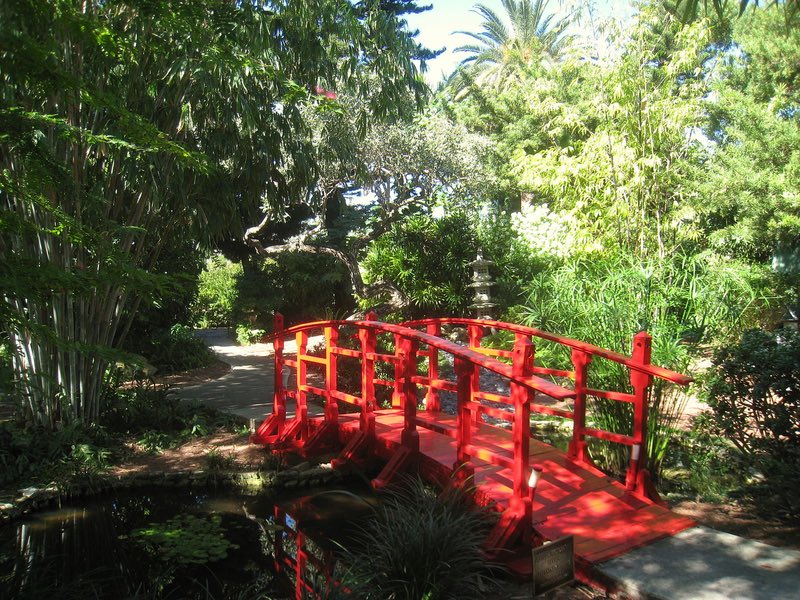


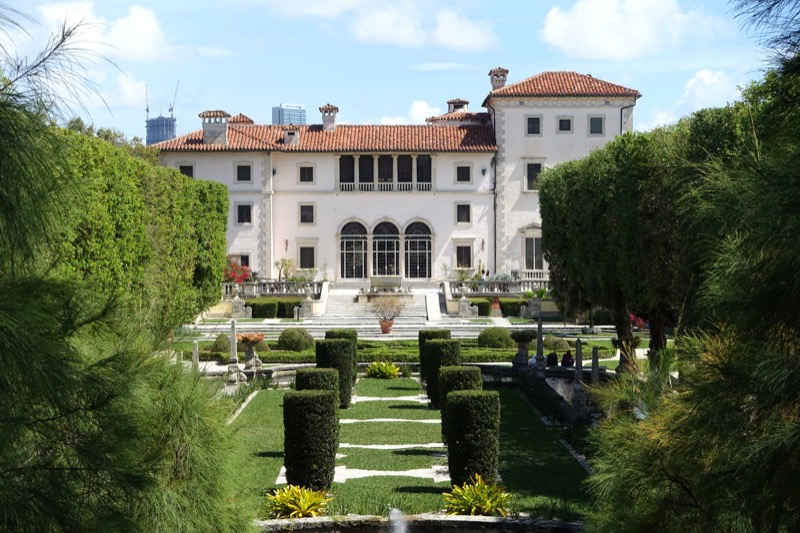
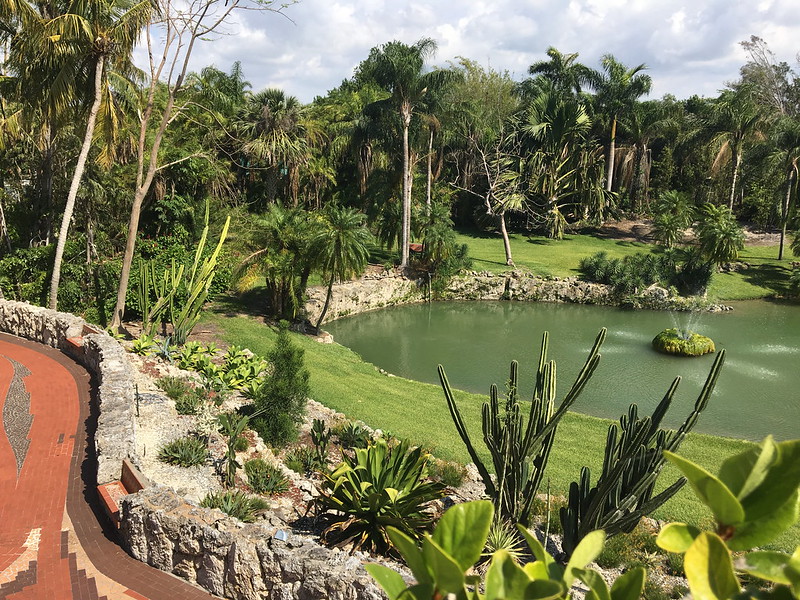

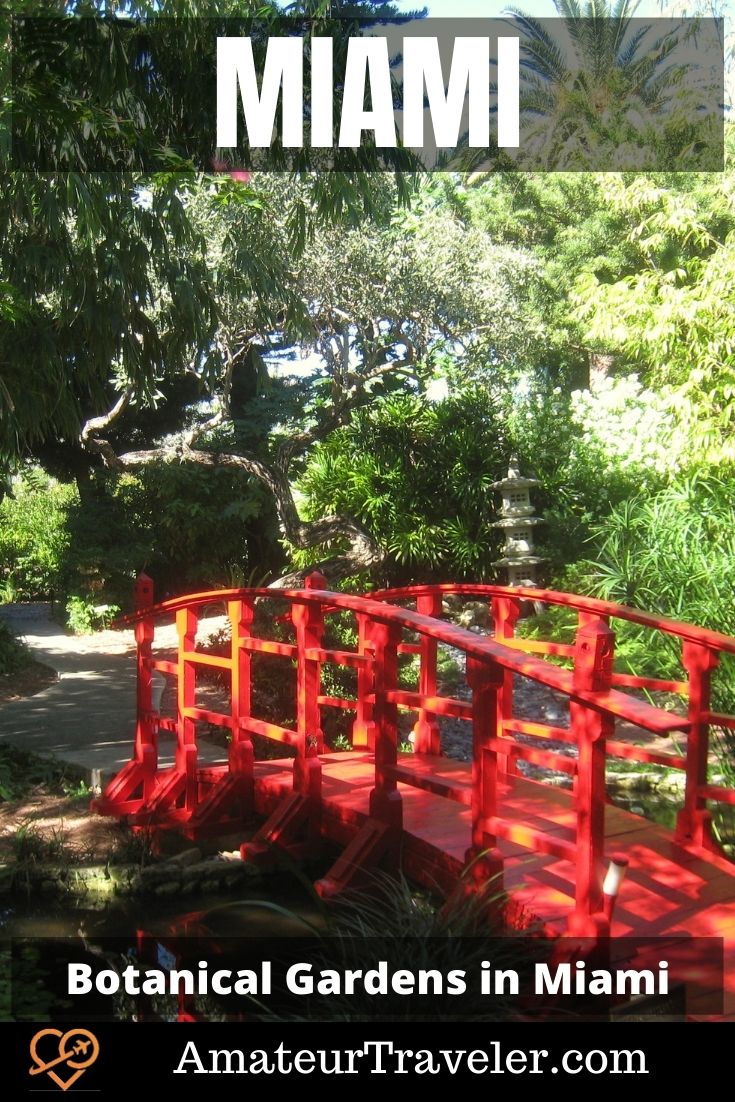
 Botanical Gardens in Los Angeles You Should Visit
Botanical Gardens in Los Angeles You Should Visit Miami Art Deco Tour and a Visit to Little Havana
Miami Art Deco Tour and a Visit to Little Havana 5 Great Places to Eat (and a Great Food Tour) – Miami Beach, Florida
5 Great Places to Eat (and a Great Food Tour) – Miami Beach, Florida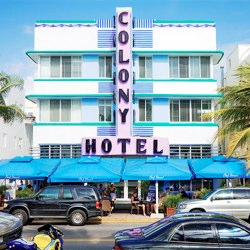 Travel to Miami, Florida – Episode 245
Travel to Miami, Florida – Episode 245

Michael Hitchcock
Says:April 23rd, 2024 at 8:12 am
Hi Amy, I am not sure if you are aware, but Zoo Miami & Gardens was awarded accreditation from Arbnet/Morton Arboretum Association. We are the largest Botanical garden in Florida. We have 750 acres, with 100 acres of protected and endangered Pine Rockland. I would appreciate if you could add our gardens to your website. Feel free to contact me if you need additional information or would like a site visit. Thank you, Michael